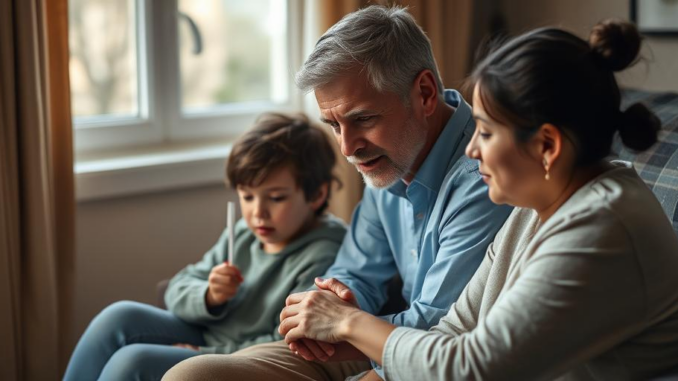
Summary
This article offers a guide for families navigating the aftermath of addiction, providing actionable steps to rebuild trust and connection. It explores the impact of addiction on family dynamics and offers strategies for open communication, setting healthy boundaries, and seeking professional support. The guide emphasizes the importance of patience, understanding, and self-care throughout the healing process.
** Main Story**
Rebuilding family ties after addiction is tough, no question about it. But it’s absolutely doable. And I’m not just saying that, I’ve seen it happen. This isn’t a quick fix, it’s a journey, but it’s one worth taking. So, let’s talk about how families can navigate the rocky road to recovery, offering support and real guidance every step of the way.
Understanding the Ripple Effect of Addiction
See, it’s not just the individual struggling with substance use; it’s a family affair. The whole unit feels the impact. Kids, especially, often end up dealing with a lot – emotional distress, instability, and sadly, a higher chance of developing their own problems down the line. And parents? They’re often wrestling with guilt, shame, and the near impossible task of maintaining a healthy family life, that’s the real struggle. So if you want to help, the first thing you have to do is recognize how addiction affects everyone involved. Once you know that, you can start to heal.
Opening the Lines: Sharing and Really Listening
Honest conversations are key to rebuilding trust. Think of it like this; you need to create a safe space. Somewhere everyone feels okay sharing their thoughts and feelings without someone judging them. You know? That’s easier said than done! It’s not just about talking though, it’s about listening. Actively listen. Hear what they’re saying, validate what they feel. I can’t stress enough, this takes time, real time, and consistent effort. You can’t rush trust, it’s something you have to earn.
- Scheduled Family Meetings: Look, life gets crazy, I get it. So, schedule specific times for family discussions. Maybe Sunday afternoons? That way you make sure everyone has dedicated time for open communication. Stick to it.
- Active Listening: Encourage active listening by asking clarifying questions and, well, repeating back what others share. Make sure you understand them properly. Show them you’re listening.
- Expressing Emotions: Create a safe space where every family member feels comfortable expressing their feelings without fear of judgment. No interrupting, no eye-rolling, just listening.
Setting Healthy Boundaries: Your Well-being Matters Too
You know, you have to set boundaries. I mean, clear ones. It’s about protecting your physical and emotional health, you can’t pour from an empty cup. These boundaries define what behavior is okay and what happens if someone crosses the line. Boundaries also stop enabling behaviors, which is important for everyone involved, and they promote self-respect. It’s not selfish, it’s essential. I remember one time, I had to tell my brother, ‘I love you, but I can’t lend you any more money.’ It was tough, but it was what I needed to do.
- Define Expectations: Clearly communicate your expectations for behavior and the consequences of not meeting those expectations. Be specific. Don’t leave room for misinterpretation.
- Consistency is Key: Be consistent with enforcing boundaries to build trust and create a sense of stability. If you say you’re going to do something, do it. Even when it’s hard.
- Self-Care: Prioritize self-care to maintain your own emotional and mental well-being throughout the healing process. Go for a walk, read a book, meditate. Whatever helps you recharge.
Seeking Professional Support: It’s Not a Sign of Weakness
Sometimes, you need a professional. And that’s okay! Professional guidance can give you valuable support and tools for families recovering from addiction. Family therapy offers a safe space to explore family dynamics, develop communication skills and also tackle underlying issues. Then there are support groups like Al-Anon and Nar-Anon, which offer peer support and guidance. Plus, individual therapy can help address the emotional and psychological toll addiction takes on everyone.
- Family Therapy: Consider family therapy to address family dynamics, communication patterns, and, of course, underlying issues. A therapist can act as a mediator and help you navigate difficult conversations.
- Support Groups: Explore support groups such as Al-Anon or Nar-Anon for peer support and shared experiences. Hearing that others have gone through the same thing can be incredibly validating.
- Individual Therapy: Seek individual therapy to address the emotional and psychological impact of addiction on each family member. This can be a safe space to process your own feelings and develop coping mechanisms.
Celebrating Small Wins: Progress, Not Perfection
Don’t forget to celebrate the small stuff! Acknowledge and celebrate milestones in recovery. Things like improved communication, following boundaries. These build confidence, and they strengthen family bonds. Keep that positive energy going, it helps everyone.
Patience, Patience, Patience: It’s a Marathon
Look, rebuilding trust, it takes time, right? Be patient, not just with others, but with yourself. Celebrate even the tiny wins along the way. Remember there might be setbacks, there almost certainly will be setbacks. But keep going. With consistent effort and support, your family can heal and build stronger, healthier relationships. It’s not going to be easy, but it’s worth it. I promise. It really is.


Be the first to comment